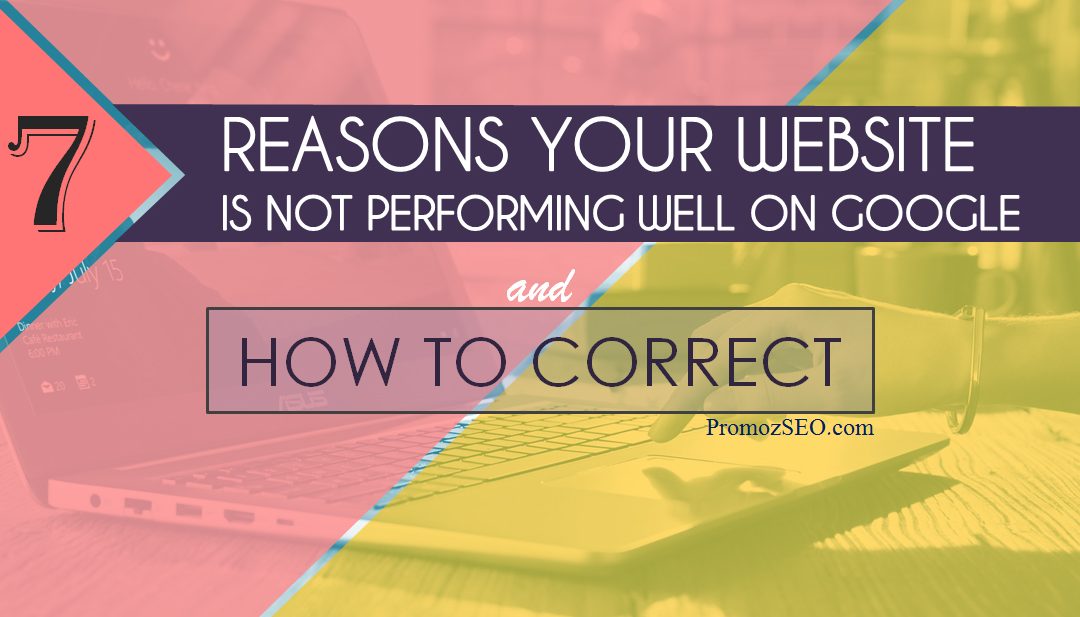Search Engine Optimization is ever changing. It is a never-ending battle where there is no winner forever. A few mistakes and you will see a deep slip on your site’s organic rankings.
If you are optimizing your website or blog for quite a long time and still not seeing any major ranking improvements, then it is the time for deep analysis. Detailed scrutiny of your website may list several issues with it, its contents and inbound links which you might not be noticed earlier. Solving these with utmost priority may bring more qualified organic traffic to your site.
Here, we are going to list 7 important traits of your website which you need to monitor and analyze consistently to gain improved search engine rankings and increased organic traffic.
1. Website’s Design and User Experience
Website’s design impacts the user experience greatly. Therefore, your site must be designed keeping your users and their needs in mind. Failing to do so can leave a poor user experience which will cost you a lot.
When designing your site and its pages, recheck whether it is easy to use by your site’s visitors. You may invite a few of your targeted consumers to use your site to get important insights about its usability.
Having user-friendly site navigation which works effortlessly is important. Design this with CSS and HTML instead of JavaScript or Jquery. Additionally, you should remember that Google is particularly not very much comfortable with crawling JavaScript coding.
Do not confuse your site visitors by creating redundant pages and contents with same or similar intents. This not only leaves bad user experience but also creates major problems for search engines as well.
Remember, many of your targeted visitors are using mobile internets. Therefore, building a mobile-responsive website following the RWD (Responsive Web Design) guidelines is a must today. Though you may use dynamic serving or keep a separate mobile site to offer a seamless experience to your site’s mobile visitors.
2. Meta Data Optimization
Site’s page titles and meta descriptions impact its organic ranking. Therefore optimizing those correctly will boost sites’ search engine visibilities.
If your website is under construction, recheck each page’s page title and meta descriptions individually. All pages of your website must have a unique page title and meta description targeting unique user intents and keywords.
For a live website, you should analyze its page titles and meta description using site audit tools. If you see multiple pages sharing the same or very similar page titles or meta description, then correct those immediately.
Ideally, a page title should be 70 characters long, where one meta description should be maximum 156 characters in length. Stuffing keywords on sites’ page titles and meta descriptions will do more harm than good.
3. Keywords and Content Quality
Keywords play major roles in organic search engine ranking. Therefore the selection of the right keywords is essential for one website’s organic success.
When targeting wrong set of keywords may not get you any organic traffic, targeting high competition keywords may also not help you much. Generally, using relevant keywords with low or medium organic competition will bring in qualified search engine traffic to your website and its pages.
Before creating the contents for sites’ pages, do detailed and in-depth keyword analysis to jot down the best of the relevant keywords.
Usually, long contents with more than 1000+ words rank better organically. Hence, develop content which covers all possible details of a topic. When creating a product page content, before you or your team starts writing it, first invest enough time in researching and planning. This will get you many new data and innovative ideas about the content and its topic. Afterward, you can describe those in your language to come up with a brilliant piece of content.
Don’t be involved in publishing duplicate contents or spinning those. Duplicating and spinning contents, and hosting those on your site will potentially damage your site, its user experience, and search engine rankings.
4. URL Optimization and Internal Linking
URL of a page has great impacts on its ranking. When creating one page, double check its final URL. If it doesn’t reflect the topic of the page clearly, then most probably you should rework on it.
Ideally shorter the URL, it’s better for ranking. But at the same time, you have to use a relevant keyword on it to make it user and search engine friendly. Keep all characters in lower case in a URL and use a hyphen to separate words instead of underscore or space.
Internal links are the doors for your visitors to browse through one page from another page of the site. This not only enhances the user experience, but internal linking has multiple other benefits as well. Internally linking pages will increase the chances of getting more page views, long dwell time, and low bounce rate. These strong user behaviors may improve sites’ search engine rankings a lot. When creating an internal link choose the anchor text phrase carefully. Irrelevant internal links and over-optimized anchor texts may create troubles for you.
5. Quality of Backlinks
There are many myths available about the backlinks and a few of those are really popular on the internet. Some believe that backlinks don’t have any impact on organic ranking. Some rely only on link building as they consider that backlinks alone can rank a website and its pages. When these are not entirely wrong, these are not absolutely correct too.
When backlinks are still very powerful for organic ranking and will remain forever, those alone may not be enough for stable search engine rankings. Link building is an art and it demands serious efforts and skills of the search engine optimizer.
Instead of believing in link building techniques, start focussing on link earning. To earn links from relevant authoritative websites you must create great things related to your industry which will benefit others. Content is one such thing which can attract lots of high-quality inbound links naturally. If you create high-value contents consistently over a period of time, those contents will start earning you backlinks. These natural and top-notch links can boost your organic ranking like never before.
If you are comparatively new in the search engine industry, you may concentrate in building a few types of safe and conventional backlinks which still deliver results. But in long run, quality contents will matter and those will acquire backlinks for you.
6. Structured Data
Although structured data is not a direct ranking signal yet, according to John Mueller of Google this can be integrated with other ranking factors in the future.
Additionally, you should consider the other benefits of structured data as you may disregard this due to its no impact in search engine rankings. A few structured data types like Review, Rating, Event etc. may show rich snippets on sites’ organic results. These rich snippets get noticed by many searchers and eventually, those sites get more visitors and higher CTR. Besides, structured data help search engines to better index your contents and other site elements.
Therefore, if you are not using structured data, especially the Schema structured data on your website, start implementing those without wasting any time.
7. Penalty or Algorithm Changes
Google and all major search engines use to update their algorithms periodically. Sites which violate search engines’ guidelines will get penalized eventually.
When Google Panda algorithm is responsible for measuring the quality of all contents, Google Penguin takes care of sites’ backlinks. Apart from these major two algorithms, Google occasionally runs and updates many other algorithms.
If you see a steep fall in your organic ranking, a recent algorithm update may be the reason.
Additionally, Google takes manual actions against websites which disobey their guidelines. Manual Action information can be seen on sites’ Google Search Console account.
Summing Up
SEO is a never-ending process which you shouldn’t stop as long as you want your website to rank on top organic positions of Google for qualified searches. When correcting the aforementioned issues may rescue your website from algorithm penalties and improve its rankings, there are many other factors which should be analyzed regularly.
Additionally, in your initial days of the site, you may not get a huge organic traffic and ranking exposures as Google keeps new websites under its testing radar. This is called the Sand Box.
Author Bio
Soumya Roy is a digital marketing consultant and Founder CEO of PromozSEO Web Marketing Academy, a digital marketing training school based in Kolkata, India. Besides, he is the lead internet marketing trainer at PromozSEO. He has been working in digital marketing and SEO industries since 2007. Being an internet marketer and entrepreneur, he enjoys writing contents on topics related to digital marketing, SEO, SEM, social media marketing, business developments, branding and many more.



